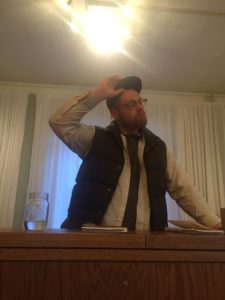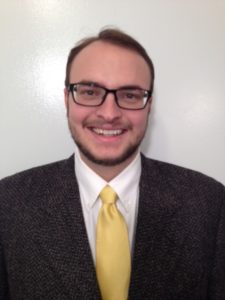A man, masked in the guise of some immortal earth spirit, rumbles in his deep baritone a song as he comes onto the improvised stage, to an audience of some fifty theopoets and scholars. His hair is moss; his eyes shine through the hip-bone holes of some vernal skeleton, the mind’s eye being born from mother earth. His hands hold a basket, or womb, or crib, redolent with the leaves and needles of trees. He sings:
I am stretched out, on your grave
and I’ll stay there forever.
This begins the “acceptance speech” turned performance from the Rubem Alves Award for Theopoetic excellence. This award, in honor to a giant within our field, was given to Tevyn East, director of Holy Fool Arts, who would shortly join her husband Jay on the stage, in the dress of Mother Nature, which had been formed from dumpster finds. She and her husband Jay were performing a small portion of their “Carnival de Resistance.” In their act, they deftly stitch together dance, song, stagecraft, Bible verses and allusion, poetry, and social activism:
Did not your prophets tell of the burning of the cedars of Lebanon?
The award winners were well-chosen, as the themes of art and activism would be a unifying strand throughout all the papers, workshops, and panels which studded the conference.
It all began, however, with Jillian Weise, and her poetry reading. Having time for a brief refreshment and some introductory remarks, the poet and scholar was introduced to a room she was very shortly to own. Her pieces touched the intersection of art and the embodied life of the person with a disability, a term which she presented with no small ambivalence, preferring instead to call herself a “cyborg.” She first read “The Amputee’s Guide to Sex,” which proffered this advice:
to create an uninhibited environment for your partner,
track their hands like game pieces on a board.
Continue reading below after enjoying this song. Reflect on the lyrics and meditate on the music’s movements.
In the Q&A that followed, Jillian talked provocatively about her activism, her body as a place where the battle for the rights of the disabled – a term she adopts with great ambivalence, preferring to call herself a “cyborg” – was waged. The community applauds, celebrates, and breaks up into talk and refreshments. Outside, a simple blackboard sign, facing the street, reads, “Poetry & Party Tonight. All Welcome.”
The first-morning panel held Scott Holland, a theopoetic scholar and regular in the field, the Transgender Social Justice Educator and writer J’Lissabeth Faughn, Lisa Hess, a scholar of interreligious learning, conscious feminine leadership and Christian spirituality, and the black theologian and scholar Adam Clark. They danced with questions of aesthetics and activism, with what is this thing theopoetics, and offered the reflections of their own fields and selves they each saw therein. An argument slowly unfurled itself over conceptions of gender, the purposes of art, the failures and benefits of preaching. As one witness later put it, “by the end, I thought it was about to go down!” And yet, we seemed to have found some peculiar gift which allowed for deep disagreement to coexist with deep connection. No small feat, given the seemingly inevitable sacrifice of one or the other in most communities.
The panels kept the discussion going, each session stretched with wide spaces for conversation, connection, and honoring of disagreement and divergence. These stretched the gamut of topics, from the esoteric nature of resistance to be found in the figure of Herman Melville’s Bartleby and expressed by Daniel Boscaljon, to the quiet and profound poetry of Jeff Gundy, under the title “Beauty is Something to Love”, to the joy and laughter of Jan Voigts “The Bible through a Comic Lens.” Beauty, activism, connection, and hidden in the corners of our conversations was some love of that surplus necessity; the idea that the best of what we were doing were the things which could not be captured in our speech, theories, and arguments.
Before our final meal together, and the Holy Fool’s performance, Troy Bronsink, the founder/director/spiritual director of The Hive led us in an embodied, contemplative grace:
Allow yourself to feel gratitude,
starting from the top of your head, and moving down…
Some would have called it worship. Others meditation. Some would refrain from putting that time in strict categories. Regardless of our words, we were together, in an expression of gratitude for our bodies, ourselves, our community, our weekend together, and that time we had to cherish that time.
The next day, a smaller group of us would gather at the local Bed and Breakfast to try and name those things, to keep some expression of them in the next conference. Words and concepts were offered, considered, and appreciated from all around the table:

“Connection.”
“Not like other academic conferences.”
“A place where artists and scholars meet.”
“I saw respectful disagreement.”
In the end, it was Callid himself, the founder and head of our theopoetic group, who named the darker elephants in the room. With impassioned, reddened eyes, he said: “At this time, when there is so much fear, and some many things falling apart, we need this. Everything is falling, and we need to be here, building something up.” Looking around, at the faces of hopeful artists, thoughtful scholars, and perhaps one silly lover of Dante, I have to agree.
 Evan is a published short story author and student of Theopoetics at Bethany Theological Seminary in Richmond, Indiana. Evan‘s editor has told him that he has to write a more human bio than he first submitted. This has turned out to be a daunting prospect, as writing about himself in the third person seems a rather artificial act, leading to inevitable self-calumny. Evan feels in this moment as if he is doing the equivalent of standing in front of a mirror, that most sacred of contemporary artifices, and attempting to describe himself in writing to someone with very little point of reference. Dürer’s “Rhinoceros” comes to this mind. Therefore, Evan would like it known that he is most certainly not a rhinoceros.
Evan is a published short story author and student of Theopoetics at Bethany Theological Seminary in Richmond, Indiana. Evan‘s editor has told him that he has to write a more human bio than he first submitted. This has turned out to be a daunting prospect, as writing about himself in the third person seems a rather artificial act, leading to inevitable self-calumny. Evan feels in this moment as if he is doing the equivalent of standing in front of a mirror, that most sacred of contemporary artifices, and attempting to describe himself in writing to someone with very little point of reference. Dürer’s “Rhinoceros” comes to this mind. Therefore, Evan would like it known that he is most certainly not a rhinoceros.
Photo Credit: Evan Underbrink

